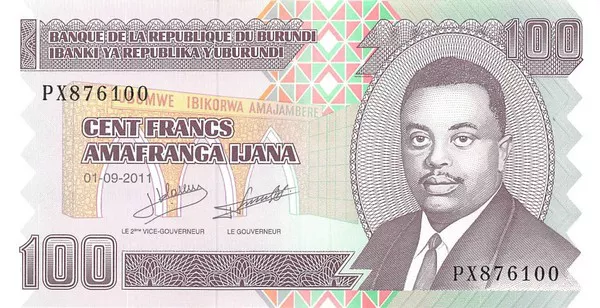In the heart of East Africa lies Burundi, a landlocked country known for its stunning landscapes, vibrant culture, and a complex economic history. At the center of Burundi’s financial narrative stands the Burundi Franc (BIF), the nation’s official currency. In this article, we embark on a journey through time, unraveling the intricate history of the Burundi Franc and exploring the economic, political, and cultural factors that have shaped its evolution.
Origins of the Burundi Franc
The roots of the Burundi Franc can be traced back to the pre-colonial era when various forms of currency were used in the region. Burundi, like many African nations, had a rich tradition of barter trade before the introduction of formal currency systems. With the onset of European colonization in the late 19th century, Burundi, along with neighboring Rwanda, fell under German and later Belgian control.
During the colonial period, the Belgian authorities introduced the Belgian Congo franc as the official currency in Burundi. This move aimed to streamline trade and administrative transactions within the broader framework of the Belgian colonial empire. However, it was only a matter of time before Burundi sought to establish its distinct monetary identity.
Independence and the Birth of the Burundi Franc
Burundi gained its independence from Belgium on July 1, 1962. With this newfound sovereignty came the need for a national currency that would symbolize Burundi’s independence and reflect its unique identity. Consequently, the Burundi government introduced the Burundi Franc (BIF) as the official currency.
The Burundi Franc was pegged to the Belgian Congo franc at par initially, maintaining a stable exchange rate. The Central Bank of Burundi, established in 1966, played a crucial role in regulating the country’s monetary policy and overseeing the circulation of the Burundi Franc.
Economic Challenges and Currency Devaluation
In the years following independence, Burundi faced numerous economic challenges, including a reliance on agricultural exports, political instability, and regional conflicts. These factors had a significant impact on the value of the Burundi Franc, leading to periods of currency devaluation.
During the 1980s and 1990s, Burundi experienced civil unrest and ethnic tensions, which further strained its economy. The currency, in response, faced devaluation to cope with economic uncertainties. The Central Bank of Burundi played an active role in implementing measures to stabilize the currency and mitigate the impact of external shocks.
Adoption of a New Currency Symbol
In 2011, as part of efforts to enhance the national identity and promote financial literacy, Burundi introduced a new currency symbol for the Burundi Franc. The symbol, “FBu,” reflects the abbreviation of Franc Burundais. This addition not only added a distinctive visual element to the currency but also aimed to foster a sense of pride and identity among the Burundian people.
The new currency symbol was well-received domestically and internationally, contributing to the recognition of the Burundi Franc as a symbol of national pride and economic resilience. The adoption of a unique currency symbol was a significant step in distancing the Burundi Franc from its colonial past and asserting its place in the global financial landscape.
Influence of Economic Policies on the Burundi Franc
Over the years, Burundi has implemented various economic policies to address fiscal challenges and stabilize its currency. The government has worked in tandem with the Central Bank to promote economic growth, reduce inflation, and maintain the stability of the Burundi Franc.
Efforts to diversify the economy, improve agricultural productivity, and attract foreign investment have been central to the economic policies of Burundi. These measures, along with collaborations with international financial institutions, have aimed to create a conducive environment for economic development and ensure the strength of the Burundi Franc in the face of global economic fluctuations.
Role of the Central Bank in Currency Management
The National Bank of Burundi, as the country’s central bank, plays a pivotal role in managing the circulation and value of the Burundi Franc. Established in 1966, the Central Bank is tasked with implementing monetary policy, regulating financial institutions, and maintaining the stability of the national currency.
The Central Bank of Burundi employs various tools, such as interest rate adjustments and foreign exchange interventions, to manage inflation and stabilize the exchange rate of the Burundi Franc. Additionally, it works closely with government agencies to formulate and implement economic policies that support the overall economic development of the country.
The Burundi Franc in the Modern Era
As Burundi navigates the challenges of the 21st century, the Burundi Franc continues to be a symbol of the nation’s economic resilience and determination. The currency, represented by the symbol “FBu,” reflects the aspirations of the Burundian people for a prosperous and stable future.
In recent years, Burundi has explored avenues for economic diversification, infrastructure development, and social welfare initiatives. The government’s commitment to fiscal discipline and sound economic policies contributes to the stability of the Burundi Franc and fosters confidence in the nation’s financial system.
See Also: Burundi Franc (BIF) Currency: History, Symbol, Codes & Denominations
Conclusion
The history of the Burundi Franc is a captivating tale of resilience, identity, and economic evolution. From its origins in the colonial era to the challenges faced in the post-independence period, the Burundi Franc has weathered the storms of history. The currency symbolizes the aspirations of the Burundian people for a future defined by economic stability, growth, and national pride.
As Burundi continues to carve its path in the global economic landscape, the Burundi Franc remains at the heart of the nation’s financial identity. The story of this currency is not just a chronicle of monetary evolution; it is a testament to the spirit of a nation that, against all odds, strives for prosperity and economic well-being.


